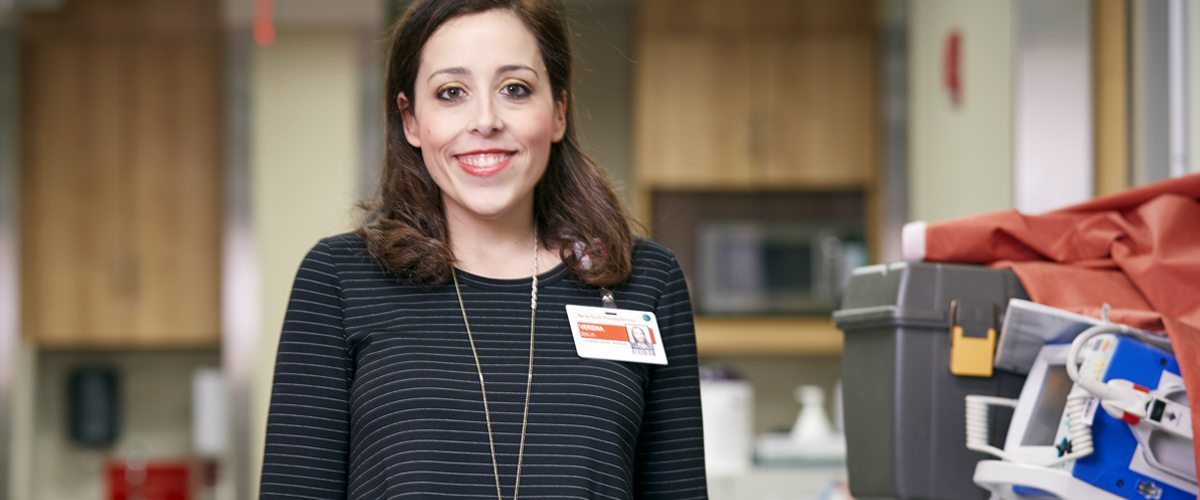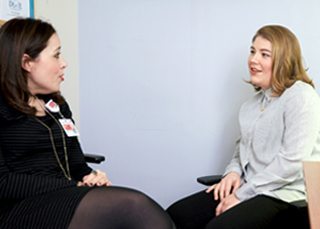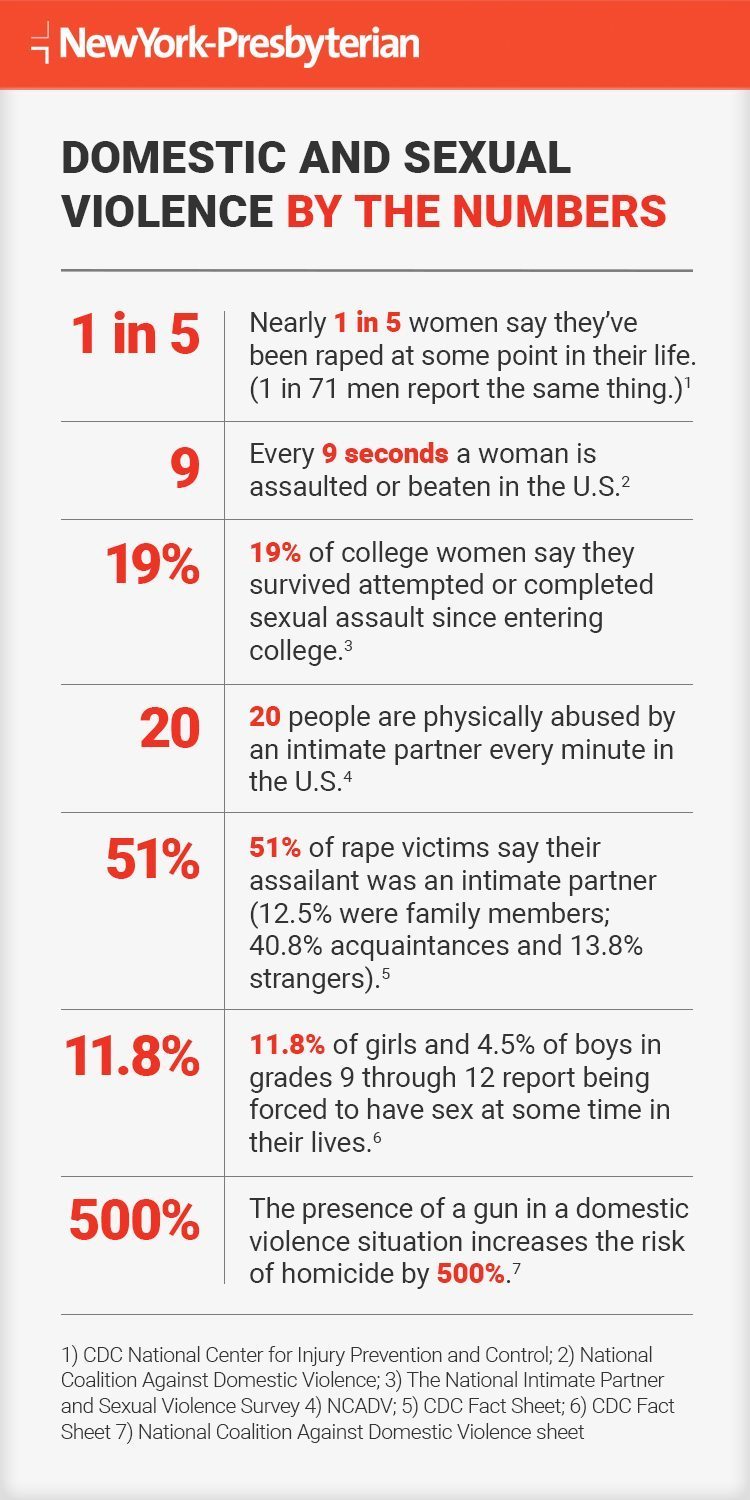Going the Distance for Survivors of Violence
Social workers with NewYork-Presbyterian’s DOVE program give victims their power back.

The calls and pages come steadily, at all hours of the day and night. A teenager who was raped by a classmate is in the emergency department. A mother whose child is undergoing an organ transplant confesses to a doctor that her former abuser is out of jail, and she is frightened. A recent immigrant reports that she was the victim of a sexual assault by a stranger.
Whenever the messages come to the Domestic and Other Violence Emergencies (DOVE) program at NewYork-Presbyterian/Columbia University Irving Medical Center, the staff members are there to see survivors through. The program, which is funded by the state, provides free ongoing counseling and services to survivors of domestic and sexual violence and each year serves about 500 people ages 12 and older.
Like many on the team, social worker Verena Salvi, LMSW, didn’t end up at DOVE by accident. A native of Rome, Italy, Salvi grew up in a home roiled by domestic violence.
“My mother was a victim, and my sister and I witnessed it growing up,” Salvi says.
Soft-spoken and quick to smile, Salvi got her start as a crisis counselor in the South Bronx 10 years ago. Now trained in several types of trauma counseling, on most weekdays she provides ongoing long- and short-term therapy to trauma patients free of charge at NewYork-Presbyterian/Columbia. Her office is a haven of comfort and color, where Indian print throws hide metal file cabinets and Hamilton memorabilia covers the walls.
On Call in a Crisis — and Beyond
On Mondays, how Salvi’s day will unfold is anyone’s guess. Instead of seeing her regular therapy patients, Salvi is on call, tasked with responding to emergencies in any area of the hospital as well as following up with patients who have come in or called the DOVE hotline over the weekend.
“Sometimes, there may be a patient in oncology or another area of the hospital,” Salvi explains, “and they end up telling their doctor that they are afraid to go home because they are experiencing violence at home.”
That doctor will page Salvi, who heads straight to the patient to explore options (whether to go to the police, whether housing arrangements are needed) and to listen.
“I don’t tell people what to do,” says Salvi, who stresses that she never pressures anyone to do anything, including report an assault to the police. “I give survivors options, and we figure out what to do together.”
Margaret is one of Salvi’s patients. Her first sexual assault, by a schoolmate, occurred when she was a 17-year-old high school senior in 2006. Two more assaults followed — one by an intruder who raped her after entering her hotel room when she was vacationing in Buenos Aires in 2012, and the other the following day, when she was mugged at knifepoint in the same city.
After the assaults in Buenos Aires, she became a person she didn’t recognize.
I don’t tell people what to do. I give survivors options, and we figure out what to do together.
Verena Salvi
“I became mean and vindictive and I was habitually drunk or high. Every day, I felt crazy or attacked; I didn’t feel safe anywhere,” she says. Still, she didn’t let those closest to her know what was going on, partly because when she’d told a friend about her assault back in high school, that person questioned her motives. “Instead of talking about it, I kept drinking, kept taking drugs and basically had no control over myself or my feelings. I was self-medicating with alcohol and drugs. I didn’t know how to go to someone to say, ‘Look, this isn’t me. I’m an honors student.’ I didn’t know where to go to start that conversation.”
Then, one day in August 2013, the memory of her assaults came flooding back. She collapsed, then called her mother and told her everything. By that fall, she was on a plane to a 30-day inpatient therapy program for trauma survivors in Florida. After that, she began two years of intensive therapy while living with her dad outside of Washington, D.C., then moved back to New York City, near her mother, ready to start fresh. She took a job as a nanny, and enrolled in a master’s program at Columbia University. “I really started my life again,” she says.
Except the healing wasn’t over.
“When trauma happens, victims often switch into survival mode,” says Salvi. “Sometimes, they push the events out of their head, because they’re not ready to talk about them. But it inevitably comes out in other areas of their life.”
For Margaret, now 27, that moment happened in 2015 while listening to a lecture by trauma survivors.
“I thought I was doing so well,” she recalls. “But after class, I went home and cried the entire weekend.”
A few days later, she confided in one of her professors, which eventually led her to the DOVE program and to Salvi.
Ready to Act When Patients Are
Unlike Margaret, most patients are connected with DOVE when they are in the emergency department, where a social worker or a DOVE advocate — a rigorously trained volunteer who is on call on weekends and after regular working hours — will stay with the survivor, often for hours.

Verena Salvi (left) with Margaret
A DOVE staff member will explain the forensic examination process, go with the individual to talk to police if that’s what a patient wants and follow up to schedule therapy appointments. Salvi and her colleagues also work with patients to ensure that they can get whatever medications they may need regardless of cost. “We don’t want anyone to go without a prescription because they can’t pay,” she says. Sometimes, DOVE staff members simply sit with survivors in the emergency department as they go through intense emotions.
Like Margaret, survivors may find their way to DOVE weeks, months or years after a violent event.
“My caseload is a mix of recent survivors and people assaulted years earlier,” she says. Some survivors hear about DOVE through the health services at their university or through community outreach. “Some want to talk for only a few sessions, others stay with me for years,” says Salvi. “When abuse happens over a long period of time, it’s not fair to expect someone to get better in just a few months.”
Different Kinds of Therapy for Different Survivors
Seeing survivors through is an intense process, and might include eye movement desensitization and reprocessing (EMDR), a treatment for people with post-traumatic stress disorder (PTSD) that helps them process difficult memories. But whether DOVE therapists use EMDR or more traditional techniques, there’s a common goal at work: Instead of just talking about what happened, trauma therapy aims to change the way the violent event is encoded in someone’s memory.
“The point is to go back to the memory in the presence of someone safe, not to undo what happened, but to replace the old experience with a new one,” Salvi explains. The good news, she says, is that human beings are wired for repair. “When you’re not going through something alone, when someone is with you every step of the way, the unbearable can be made bearable again.”

Beyond therapy, Salvi and the DOVE team also pay attention to what else is happening in a survivor’s life.
“Sometimes a survivor, if she is a student, might want to talk about feeling anxious about her exams. We will never say, ‘No, we’re here to talk about your rape,’” says Salvi. “Violence always happens in the context of someone’s life. We never have an encounter with a patient without recognizing who she is and what she is passionate about, without recognizing her humanity.”
Another reason Salvi asks survivors about the bigger picture is because friends and family can be integral to recovery.
“I always ask how a person’s loved ones are acting,” Salvi says. “If they’re judging or blaming, that can lay the groundwork for the patient developing PTSD.”
Sometimes, Salvi brings in family members for several sessions so they can learn to respond in ways that help the survivor.
“Ultimately, you want to tell someone, ‘This is not your fault. I believe you and I’m here for you,’” Salvi says. “That kind of reaction can go a long way toward healing.”
Giving Control Back to Survivors
One thing Salvi won’t do is to tell survivors what to feel or what steps to take — whether that’s pressing charges against an attacker or leaving an abusive partner.
Instead, Salvi says, DOVE reminds survivors that only they know what is best for them. Handing power back to someone who has been abused is important during the therapeutic process.
That can be tough when someone chooses to go back into a dangerous situation.
“But we’ve learned by experience that you can’t tell people what to do. It doesn’t work,” she says. “When you tell someone what to do, they don’t come back. Ultimately, we want to keep them in the room so that when they are ready to leave the abuser, they are prepared, and they can do it safely.”
In a little over a year of working with Salvi at DOVE, Margaret says she has met the three main goals she’d set for herself going in, including cutting people out of her life who reminded her of the assaults. She also says she has gotten past her fear of sleeping alone in a hotel room. “It was hard, but I did it, and it was awesome,” Margaret says.
Margaret is also thrilled about meeting her third goal — of finding a healthy, loving relationship. She met her boyfriend on a dating app and immediately clicked. “He’s a really amazing person.”
The pair recently moved to the Southwest, where Margaret plans to look for a job as a communications officer. And while she still has the occasional bad day, when the memory of one of the assaults comes back to haunt her, “I now have the coping skills to deal with those days, to not let them throw me off,” she says. “That’s a huge part of recovering.”
“I feel human again,” Margaret says.
